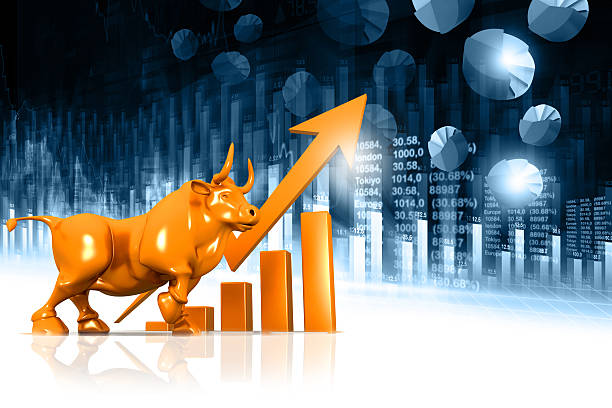The stock market, which consists of various exchanges and platforms where buyers and sellers trade financial securities, is constantly evolving. The dynamics of the stock market are influenced by various factors, including economic conditions, investor sentiment, and global events. In 2025, the stock market trends differ significantly due to factors like inflation, interest rates, and technology.
The Impact of Interest Rates on Current Stock Market Trends
One of the most significant influences on the current stock market trends is the interest rate policies implemented by central banks, particularly the U.S. Federal Reserve. Rising interest rates have been a major factor driving volatility in the stock market. When interest rates rise, borrowing costs increase, reducing spending and investment for businesses and consumers. Sectors like real estate and utilities, which are sensitive to interest rate changes, may see stock price declines. Investors often shift their focus to stocks in industries that can withstand higher borrowing costs, such as technology or energy.
In the past few years, the Federal Reserve’s response to inflation has significantly impacted stock market movements. As interest rates rise, stocks may initially dip, but some sectors may rebound once the market adjusts to new rate expectations. The stock market remains highly sensitive to any signals of rate changes, which continues to influence current stock market trends.
Technology’s Influence on the Current Stock Market Trends
Technology continues to dominate the current stock market trends. The growth of tech stocks has been one of the defining characteristics of the market over the past decade. As digital transformation accelerates across industries, companies involved in artificial intelligence, cloud computing, cybersecurity, and electric vehicles (EVs) have gained traction. Companies like Tesla, Apple, and Microsoft continue to outperform the broader market, reflecting the increasing importance of innovation and technological advancement in the current economy.
One of the most notable technological developments influencing current stock market trends is the rise of artificial intelligence (AI). The integration of AI into industries such as healthcare, finance, and manufacturing has sparked significant investment in AI-focused companies. AI’s potential to revolutionize various sectors is creating opportunities for substantial returns, making technology stocks an essential area of focus for investors seeking to capitalize on the current stock market trends.
Global Economic Factors and Their Effect on Current Stock Market Trends
Global events and economic factors play a crucial role in shaping current stock market trends. Trade policies, geopolitical tensions, and supply chain disruptions can lead to market instability and affect investor confidence. For example, the U.S.-China trade war and the Russia-Ukraine conflict have had significant repercussions on the global stock market, leading to short-term volatility.
Additionally, the ongoing recovery from the COVID-19 pandemic continues to influence market movements. Certain industries, like hospitality and tourism, are still affected by the pandemic, while sectors like e-commerce and remote work continue to excel in today’s stock market trend.
Inflation and Its Impact on Stock Market Trends
Inflation remains one of the most prominent factors driving current stock market trends. When inflation rises, the purchasing power of consumers declines, which can lead to reduced demand for goods and services. Companies may struggle to pass on increased costs to consumers, leading to lower profit margins. In response to inflationary pressures, central banks often raise interest rates, which in turn impacts stock prices.
While inflation concerns have led to market volatility, certain sectors are better positioned to weather these storms. For example, consumer staples and energy stocks are traditionally considered more resilient during inflationary periods, as demand for essential products tends to remain stable even when prices rise. This shift toward defensive stocks is a key trend in the current stock market.
Investor Sentiment and Market Volatility
Investor sentiment plays a critical role in determining current stock market trends. Stock prices are often driven not only by fundamentals but also by how investors feel about the future of the market. When sentiment is optimistic, stocks tend to rise, and when sentiment is pessimistic, stocks decline. This has been particularly evident in recent years as investors have become increasingly cautious about the effects of inflation, interest rate hikes, and global uncertainty.
Market volatility is another defining feature of the current stock market trend. Due to algorithmic trading and social media impact, stock market volatility has intensified. The 2020-2021 meme stock frenzy, exemplified by GameStop’s dramatic price fluctuations due to retail investors, showcased market’s potential for extreme swings.
Sustainable Investing and ESG in Current Stock Market Trends
Another emerging trend in the stock market is the growing focus on environmental, social, and governance (ESG) factors. Investors are favoring companies with strong ESG practices for sustainable investing, aligning portfolios with values and emphasizing sustainability, transparency, and ethics amid growing climate change concerns.
The rise of ESG investing is not just a passing trend but rather a shift in how investors view long-term value. Companies with strong ESG credentials are often seen as more resilient, as they are better positioned to navigate future challenges related to environmental regulations, social issues, and corporate governance.
Conclusion
In conclusion, the current stock market trends reflect a complex mix of economic factors, technological advancements, and shifting investor sentiments. Interest rates, inflation, and global economic conditions are all playing significant roles in shaping the market’s trajectory. Technology continues to lead the way, particularly with the growth of AI and other digital innovations. Additionally, sustainability and ESG investing are becoming more central to how investors allocate their capital.
As the market evolves, it is crucial for investors to remain informed and flexible, adapting to the changes that define the current stock market trend. Understanding these dynamics will help investors make more informed decisions and navigate the ever-changing financial landscape.

